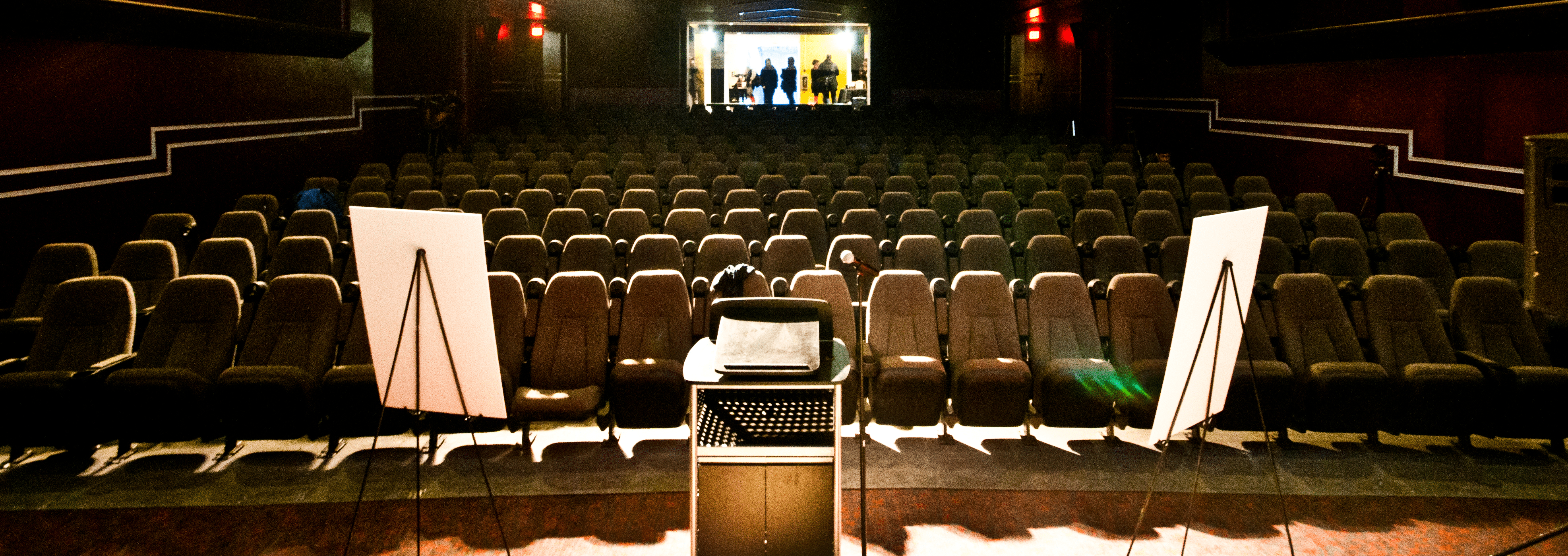After an unexpectedly long hiatus, the Bloor Cinema, a neighbourhood institution, is set to reopen on March 16 with a brand new name and some slick upholstery. It will now be called the Bloor Hot Docs Cinema, a joint venture between the largest documentary festival in North America and Toronto-based Canadian film and television investment company Blue Ice Group. Hot Docs acquired the lease from the Bordonaro family last summer when the theatre was gasping for breath, and whispers of its end were making the rounds throughout the city’s art community.
“When the future of the Bloor was in question, it was a priority for us for this venue to be around for Hot Docs films,” Hot Docs managing director Brett Hendrie explained. “The more we explored that idea, we realized there was more potential here.” Last summer, Hot Docs executive director Chris MacDonald maintained that the venue only required a simple facelift. But at a recent noontime press tour that was accented with guys in hardhats, alarm testing, and dust that had barely settled, it was clear that a lot has changed at the Bloor.
The lobby area has been redesigned, with the concession area shifted to the side in order to showcase a central glass pane which looks directly into the theatre, a design flourish which is meant to recall the Bloor’s former life as a vaudeville theatre. The seats have been replaced with the same model of recliners that Michael Moore chose for his Traverse City Film Festival Theatre: these chairs are cushiony and have movable armrests. Speakers have finally made it all the way to the balcony, and the sound has been updated to Dolby 7.1 along with a screen that’s 10 per cent bigger — 40’ by 17’ (2.35:1 aspect ratio). The original 35mm rigs are now joined by a crisp new Christie Digital projector, and the booth can now accommodate virtually every format.
The reopening of the Bloor comes at a pivotal moment in the history of Toronto’s cultural development, as the city negotiates not only its role as a destination for filmmakers and film-watchers, but also its aspirations as a world-class city with a unique cultural landscape. At a time when the city’s cultural identity crisis seems to have reached its peak, the renovation and reopening of a beloved institution like the Bloor Cinema is met with expectation. But not everyone is happy about the way it’s going down. Catering to a highly demanding film community that knows what it wants, a documentary-focused program has enticed and excited some, while confusing and alienating others.
“Great documentaries are effective for all the reasons that great cinema is effective. They can have great stories, great characters, and they’ll move you emotionally,” Hendrie explained. But for those who cherished the Bloor’s role as a repertory cinema house, year-round documentaries may be a hard sell.
“We’re looking into bringing Rocky Horror back: some of the tried-and-trues that people knew the Bloor for … I’ve been watching those films here for forever so I’d hate to see them disappear entirely,” programmer Robin Smith assured concerned Bloor Cinema diehards when asked about the theatre’s classic programming. “We’re not turning our back on [fictional films] but I have to be honest and say we’re a documentary festival and so that’ll be a big focus of what we do. It’ll be something like 75 per cent docs and 25 per cent fictional films. But it’ll evolve, it’ll be a progress.”
Documentary cinema has always been a niche market: it’s not really the category that the masses place bets on during Oscar season. While dedicating an historic 710-seat theatre almost exclusively to documentaries is a bold move, Smith believes it’ll start a dialogue about all the right things. “It’s getting harder to find real information about what’s going on. Docs have always been a great way of informing yourself. Having hundreds of people watching the same thing at the same time and then having the dialogue afterwards is just perfect.
“Of course we will be looking back into organizations like Toronto After Dark and Rue Morgue who have notoriously done a lot of projects here. I’m not a pretentious programmer by any means,” Smith assured us. While that’s comforting, it goes without saying that he and the entire Bloor Hot Docs Cinema team have their work cut out for them.
The opportunity to screen documentary cinema presented itself at an opportune time for the Bordonaro brothers, a pair of unabashed cinephiles whose love for great films is as obvious as their bitterness about the current state of art and intellectual cinema. “Hollywood was taken over by accountants, and they’re willing to see this all crash and burn as long as they can sell it somewhere else. They have no respect for the [movie houses] who kept them along on this hundred-year journey. Now they’re feeding you a McDonald’s film diet, pushing the Big Mac instead of working hard at giving you a home-cooked meal.”
So while it may not be an ideal situation for some, the fact that the Bloor Cinema avoided death by download is a good news story for Toronto. What’s more, the architectural integrity of the place remains intact with positive improvements that won’t be too disorienting for anyone. “This building will be a home for [a documentary-centered] cinematic experience,” Hendrie told the press. Robin Smith, however, insisted on proceeding with a level of caution. “The proof will be in the pudding. I’m convinced we’ll be successful, but I’m the type of person who acknowledges that it’ll be a slow build.”
Bloor Hot Docs Cinema will host free open-house screenings of Lucy Walker’s acclaimed documentary Waste Land on March 12 and 13. It officially opens for business on March 16 with commercial engagements of Being Elmo: A Puppeteer’s Journey and Corman’s World: The Exploits Of A Hollywood Rebel. Complete programming can be found online, along with membership options.


